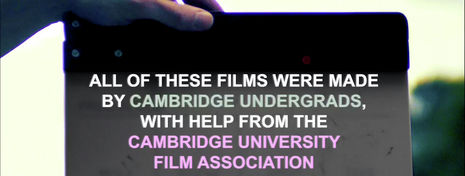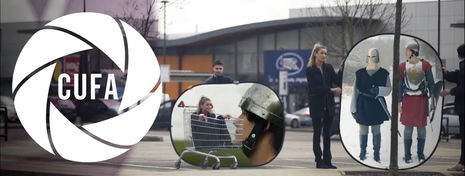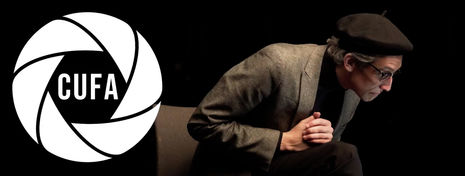CUFA and the Cambridge Film-scene
Film&TV Editor Magdalena Gabrysiak talks to the president of the Cambridge University Film Association Jasper Cresdee-Hyde about ways to get involved in student filmmaking and the future of cinema

MG: So tell me, why did you decide to apply for the president position at the CUFA?
JCH: I had served on the CUFA committee already, I was co-producing Cambridge shorts in my first year, which is a regular showcase of films made by Cambridge students as well as students from Anglia-Ruskin University. At the time, the event was organised separately from the Cambridge Film Association, until we sat down with the previous CUFA presidents and decided to combine them. Since then, we’ve managed to organise a few more online showcases, and the experience was so rewarding that once the time came to decide what I would like to do in my third year, I thought leading the CUFA-committee would be a wonderful opportunity. And luckily, I got selected to do so.
MG: The CUFA Facebook page says that the Association provides ‘workshops and talks’ for student filmmakers. What kinds of workshops do you organise specifically and for whom might they be of most interest?
“spending the year on zoom we have all grown much more accustomed to the basics of video-making: good sound, proper lighting, high camera-quality”
JCH: We provide various workshops and talks with student alumni as well as different creatives from the film-industry. We are planning to increase the amount of such events this year to show current students what previous graduates are up to, talking about the practicalities of getting into this seemingly enigmatic industry. The CUFA also organise talks centred around specific topics, for example last year in Michaelmas Term we had a screenwriting workshop with a student who had written a Cambridge-funded short film a few years ago. But we also run events with professional creatives established within the film-industry; well-known people like Ken Loach and a hugely diverse array of creators who work at all levels in the film industry. Alongside those informative socials, however, we provide advice and equipment for student filmmakers. To list even more, we also have a weekly film-club, where people meet up to talk about a specific film as well as showcase events like the Cambridge shorts – part of our ‘Fresh to Film’ programme which brings together first-time filmmakers and gives them the chance to fully create a film of their own. So all in all, CUFA really is the home of filmmaking at Cambridge.

MG: How has the CUFA changed during the pandemic?
JCH: That is an interesting question. Obviously, as with everything, we needed to organise all our in-person events and meetings online. But in terms of how the CUFA operates it has been interesting because – apart from imposing a plethora of limiting constraints – the move to online events provided a lot of opportunities that would not have been possible otherwise. We were able to book way more speakers than usual and bring those to an even broader range of students. But most of all, I think, the whole of last year has made people realise the importance of film, with everything being online and through video we have collectively come to understand how much of our lives happens through and on a screen. So, this year, we are keeping all the enthusiasm and ambition that couldn’t be realised in the midst of the COVID pandemic, while also transferring everything we have learned about film and its pertinence in our day-to-day lives.
MG: How would you – as the president of the Cambridge Film Association – describe the Cambridge film scene, its highlights, and the best ways to get involved as an incoming Fresher?
JCH: The best way to get involved for an interested Fresher is to get to know the CUFA, following our social media pages to be informed about all our upcoming events and showcases. But with the Cambridge film-scene, I think, the problem is that it does not really exist, it’s a bit of a wild west, because it only happens when CUFA is active and when students themselves decide they want to make a film and advertise for it. It is not a coherent ecosystem, like the Cambridge Theatre for example, with lots of established institutions. And essentially, we want to change that, we want to imagine what an institutionalised Cambridge film-scene could look like. But there are of course other events, like the Watersprite Film Festival – one of the biggest student-run film events in the country, which is organised mostly by students from Cambridge and Anglia Ruskin University, so there are many different ways to get involved and further create the Cambridge film-scene.

MG: Has the COVID pandemic impacted students’ interest in film and filmmaking at Cambridge?
JCH: Yes absolutely, I think the pandemic really heightened students’ interest in film and filmmaking. I mean, we all have been watching way more films than usual this past year; but also because of spending the year on zoom we have all grown much more accustomed to the basics of video-making: good sound, proper lighting, high camera-quality. Moreover, with Cambridge Theatre going online many creators there have developed their filmmaking skills as well, producing radio-play and zoom plays etc. So, CUFA is here to facilitate and build on all our experiences this past year and we would really like to enhance cooperation with theatrical societies. Ultimately, I think the pandemic has heightened our awareness of the many technical aspects of film and caused way more people and students to become interested in this wonderful medium.
MG: As a filmmaker yourself, what advice would you have for any amateurs who want to start working creatively in film?
JCH: The one, most important thing I would say is: think about how your story is being told and can be told through film. So, think about what makes it a film, and that goes from big things, like considering different structures of visual storytelling and how to cut through different locations, but also down to specific minutiae like: can my characters be played by a young cast, or does the script require age-specific, adult actors. So, you should consider the practicalities and limitations of film and work creatively with what resources you have. It’s about thinking at every step of shooting and production: what makes this decision a good fit for film? How do I visualise this?
“there is such a range and diversity of productions and brilliant projects amongst Cambridge students”
MG: How, in your opinion, has the pandemic changed the way we consume and experience cinema?
JCH: It’s really interesting. I think, the pandemic broadly has accelerated a lot of trends that were happening anyway, but it has also exposed how some of our predictions regarding cinema might actually turn out to be wrong. One such example is the constant debate about how cinemas are on their way out and everything will be reduced to at-home streaming in the future, which almost everyone in the US as well as the UK was predicting. And now, at a time when all this has actually happened, we realised that this is not ideal and people don’t actually like it. All of a sudden, we want to go to the cinema and have that experience. So, I think that has been a very interesting consequence of this pandemic. It’s changed our expectations of what we thought the future of consuming film is going to look like and in a way it has perhaps even saved cinemas.

MG: Do you yourself have a favourite film, that you remember first sparked your interest in cinema?
JCH: The first film I ever saw in a cinema was Finding Nemo, which I very vividly remember, so that movie has always held a very special place in my heart as a very emotional, evocative, and very sentimental film, but also an incredibly funny and at times melancholic one. It truly does a great job of balancing a lot of genres and emotions and moods. But beyond that, I don’t really have a favourite, I find it impossible to pick one. I really admire Alfonso Cuaron’s Y tu mamá también, which is a wonderful coming-of-age story. But I also love well-crafted, blockbuster filmmaking, like Star Wars: The Last Jedi for example; movies that make you feel like you’ve just eaten a perfect, delicious feast.
MG: What was your favourite student-made film at Cambridge from the last year or two, and why that one?
JCH: The first films that come to mind are the ones that screened at the Cambridge shorts festival last year. Our outgoing production officer Zeb made a really great short called Convalescence, which was a student written and entirely student made film. He has just released it on YouTube. It has really brilliant cinematography. We showcased another film called Last man, which was very beautifully shot. At last year’s Cambridge shorts festival there was also a documentary entitled Their story about the homeless community at Cambridge, which was masterfully done, very emotional, personal and interesting. Honestly, there is such a range and diversity of productions and brilliant projects amongst Cambridge students that I could go on listing films all day.
MG: Not to mention all the wonderful projects that you are bound to showcase this upcoming year, we at the Film&TV Section cannot wait to see them!
 Comment / Plastic pubs: the problem with Cambridge alehouses 5 January 2026
Comment / Plastic pubs: the problem with Cambridge alehouses 5 January 2026 News / Cambridge academics stand out in King’s 2026 Honours List2 January 2026
News / Cambridge academics stand out in King’s 2026 Honours List2 January 2026 News / Cambridge businesses concerned infrastructure delays will hurt growth5 January 2026
News / Cambridge businesses concerned infrastructure delays will hurt growth5 January 2026 News / AstraZeneca sues for £32 million over faulty construction at Cambridge Campus31 December 2025
News / AstraZeneca sues for £32 million over faulty construction at Cambridge Campus31 December 2025 Interviews / You don’t need to peak at Cambridge, says Robin Harding31 December 2025
Interviews / You don’t need to peak at Cambridge, says Robin Harding31 December 2025










